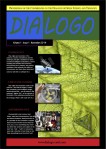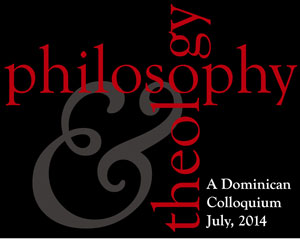The conference in Innsbruck was very successful. But I must acknowledge that presenting my stuff in front of the audience trained mainly in analytic metaphysics, theoretical physics, and philosophy of physics, is a tough thing to do. The Q&A session was a challenge. I’ve established some good relations with the people form the theological faculty at the university of Innsbruck. I have just uploaded the full version of my paper online. You can find it HERE.
Category Archives: Agency
Metaphysics of Downward Causation
I have just finished writing my presentation for the conference on Agency and Quantum Physics in Innsbruck. I’m excited about it. This is the first time that I’m invited to give an hour long talk at the major session of an international conference. The conference begins on March 30th and ends on April 2nd. Here is the abstract of my paper:
Metaphysics of Downward Causation:
Nonreductionist Physicalism versus New Aristotelianism
Mariusz Tabaczek, O.P.
Graduate Theological Union, Berkeley, CA
Abstract
Many proponents of methodological nonreductionism in contemporary science find the notion of downward causation (DC) a sine qua non of the strong (ontological) version of emergence (EM), which strives to give an account of the irreducible character of the complex levels of the organization of matter. But what for many is the essence of nonreductionist physicalism, carries with it quite a bevy of problematic issues, and becomes a stumbling block and an obstacle for those, who acknowledge the metaphysical and logical inconsistencies of the emergent theory based on the idea of DC. For how can physicalism be non-reductionist? How can DC be reconciled with the causal closure of physics? What do “higher” and “lower” levels refer to? What is causal in DC? What is being caused (acted upon)? What is the very nature of DC?
I will argue that the defense of DC requires from us a broader notion of causation, which goes beyond the efficient causes accepted and described in modern science. I want to argue in favor of the retrieval of formal causation in particular. Its acceptance not only makes EM and DC plausible, but also helps to overcome and replace Humean causation of events with the causation of living and non-living beings, explained in terms of their causal powers and dispositions. I hope to show, in the course of my presentation, that true non-reductionism needs to be philosophically grounded. Yet it can still remain compatible with science provided it values and is open to the reflection offered by philosophy of nature. My position follows new Aristotelianism developed within the analytic tradition, although an explicit reintroduction of formal cause goes beyond it to the original thought of Aristotle.
Aristotle & Evolution
I want to share the news about my latest publication – an article on Aristotle and evolution published in the proceedings of the 1st Virtual international Conference on the Dialogue between Science and Theology organized by RCDST of Ovidius University of Constanta, Romania.
An Aristotelian Account of Evolution and the Contemporary Philosophy of Biology
The article is also available HERE
Abstract:
The anti-reductionist character of the recent philosophy of biology and the dynamic development of the science of emergent properties prove that the time is ripe to reintroduce the thought of Aristotle, the first advocate of a “top-down” approach in life-sciences, back into the science/philosophy debate. His philosophy of nature provides profound insights particularly in the context of the contemporary science of evolution, which is still struggling with the questions of form (species), teleology, and the role of chance in evolutionary processes. However, although Aristotle is referenced in the evolutionary debate, a thorough analysis of his theory of hylomorphism and the classical principle of causality which he proposes is still needed in this exchange. Such is the main concern of the first part of the present article which shows Aristotle’s metaphysics of substance as an open system, ready to incorporate new hypothesis of modern and contemporary science. The second part begins with the historical exploration of the trajectory from Darwin to Darwinism regarded as a metaphysical position. This exploration leads to an inquiry into the central topics of the present debate in the philosophy of evolutionary biology. It shows that Aristotle’s understanding of species, teleology, and chance – in the context of his fourfold notion of causality – has a considerable explanatory power which may enhance our understanding of the nature of evolutionary processes. This fact may inspire, in turn, a retrieval of the classical theology of divine action, based on Aristotelian metaphysics, in the science/theology dialogue. The aim of the present article is to prepare a philosophical ground for such project.
Dissertation Proposal
Emergence and Divine Action:
Exploring the Dispositional View of Causation
as a New Philosophical Foundation
My dissertation proposal was accepted at the GTU systematic and philosophical theology area meeting on Oct 15. All I have to do is to have it approved by the GTU doctoral council (sometime in November) and then write it. 🙂 Few words of explanation concerning my current research that I wrote in an email sent to a scholar that I am corresponding with online, will serve as a good introduction to the topic of my work.
The reason I got interested in the dispositional metaphysics is its rejection of Humean view of causation and re-connecting with Aristotelian metaphysics and philosophy of causation. But there is not an easy connection that one can establish between the two I’m afraid. Although some thinkers like Brian Ellis argue in favor of essentialism (see his Scientific Essentialism), they are not ready, nor willing to accept hylomorphism. The other problem is teleology. Molnar speaks about the natural “physical intentionality” of powers to manifest themselves, but hardcore Aristotelians are not satisfied. For them Aristotle’s distinction between active and passive potencies is crucial. They emphasize the character of the active potencies which are causal grounds of certain effects but without being determined to those effects by nature or without requiring any stimulus condition to obtain. (See for instance the paper by Errin Clark, which will be published soon in proceedings of the ACPA conference that took place a week ago in D.C and was dedicated to dispositional metaphysics) But this whole argumentation sounds like another criticism of conditional view of causation which is criticized by several dispositionalists – so they can defend themselves here. But the question remains: how Aristotelian is dispositional metaphysics???
Complex systems approach, emergence and systems theory are fascinating in terms of their re-discovery of complex structures and their holistic approach to reality. But they are stuck with the Humean view of causation which is based on his atomistic ontology of events and his dismissal of the ontology of objects. But one ontology cannot do without the other. Objects have properties (smell, age, physical construction) which cannot be ascribed to events. But acknowledging this requires from us a step beyond efficient causation which is the only one accepted in modern science. But scientists are very suspicious about making this move and buying into formal and final causes. They want to eat the cake and have it. That is, they argue in favor of irreducible complexity in systems theory, while saying – at the same time – that after all everything is explainable at the level of physical particles. They call themselves “non-reductionist physicalists” which I think brings a logical contradiction. If they are willing to buy into formal and final causes they claim – as Deacon does – that they emerge on the way of the growing complexity of the organization of matter, whereas for Aristotle these causes are simply out there all the time and ground all structures and processes not only bottom-up or top-down, but – as my advisor Michael Dodds OP says – inside-out.
Dominican Colloquium 2014 Berkeley
We are almost at the end of the first Dominican Colloquium organized by the Dominican School of Philosophy and Theology in Berkeley: What Has Athens to Do with Jerusalem? Dialogue between Philosophy and Theology in the 21st Century. The event is really great. Lots of first rate philosophers and theologians from the US and Europe. Lots of good plenary sessions and conversations. We have among us the master of the Order Fr. Bruno Cadore and the provincial of the Province of the Holy Name of Jesus, Fr. Mark Padrez. I’m also happy to meet fr. Michał Paluch, the regent of my Polish province. Both Michał and I presented our papers yesterday. He did it in a plenary session, and I in the evening breakout-session. I think both were successful. Michael spoke on the topic of analogy of attribution versus the analogy of proportionality in Aquinas. His paper provoked a very interesting discussion with Stephen Long who is an author of a recent book on the topic and is present here too. I presented on the powers view of causation and divine action. Several people congratulated me on the paper, the manner I presented it and on the power point presentation that accompanied my speech. Hereunder you can find a summary of my paper. More about the conference on the DSPT website.
A Powers View of Causation and Divine Action: New Aristotelianism in Analytic Philosophy and Theology
Mariusz Tabaczek, OP, Graduate Theological Union
If “God is and God acts”, then “we need a language of causality” – says Michael Dodds, O.P. – showing thus that the connection between theology of divine action and philosophy of causation is indispensable. What is then the present stage of the debate on causation in philosophy? After the rejection of final and formal causes as not observable, not quantifiable, and not capable of empirical investigation in the modern science, the final blow against causation came from Hume, who reduced even efficient causes to the impression of the constant conjunction and the idea of necessary connection in our mind. The contemporary philosophy of causation, following the anti-Humean turn, seems to be concentrated on an attempt to prove the reality and ontological character of efficient causes. Such is the main concern of major theories of causation in analytic tradition (necessary and/or sufficient conditions, counterfactual, probabilistic, singularist, process, instrumentalist, and interventionist views of causation). However, the same tradition brings one more theory, which opens a way back to the more robust philosophy of causation. A ‘powers and capacities’ view of causality defines dispositions and properties of things and organisms as a distinct, basic, and irreducible ontological category, and a source of their identity and activity. The acceptance of powers and capacities can lead to accounts of laws of nature and modality. Moreover, the idea of powers and their manifestations resembles Aristotle’s notion of formal and final causality. In my presentation I will describe the powers view of causation and explore its possible use in theology of divine action. I claim that it may be helpful in reintroducing Aquinas’ view of divine action, his emphasis on the fact that God is not an agent univocal with creatures, and his attempt to find a proper balance between God’s transcendence and immanence.
Innsbruck 2015
I am sharing the great news. I was invited to give a talk at the conference organized by a group of philosophers and physicists working on a Templeton-project on ‘agency’ in Insbruck, Austria. The conference takes place from March 30 – April 2 (2015) at the University of Innsbruck. I was asked to deliver a talk on the ontology of downward causation (and agency). This is an amazing opportunity for me to both share and further develop my thoughts on the topic of emergence, downward causation and agency. It is also an occasion to make some connections with the Templeton foundation which is one of the major sponsors of the theology and science debate. I am very happy and excited about this invitation. Here is the official website of the conference.



